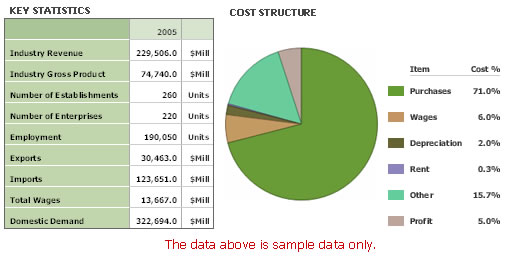Explosive Manufacturingin Australia
Australia Market Research and Industry Report
19 October 2007
Industry Code : C2541
This industry comprises management units primarily engaged in the manufacture of explosives. These are deemed to be chemical compounds or mixtures that burn or decompose rapidly generating large amounts of gas, heat and pressure. The main product segment comprises various explosives (including primary explosives, secondary explosives and high explosive materials), followed by fireworks and matches. Industry participants may also be involved in the production of blasting accessories such as blasting and detonating caps, fuses and cords, detonators and safety fuses. Raw material inputs are sourced from other components of the overall chemical industry (namely the fertiliser and the industrial gas manufacturing industries). The finished product is then primarily sold to the various mining industries, as well as the construction industry. The industry is not concerned with the production of ammunition.
The major products and services in this industry are:
| - | Secondary explosives |
| - | High explosive materials |
| - | Primary Explosives | |
The primary activities of this industry are:
| - | Blasting powder manufacturing |
| - | Cap, detonating or fuse, manufacturing |
| - | Detonator manufacturing |
| - | Dynamite manufacturing |
| - | Firework manufacturing |
| - | Fuse, explosive, manufacturing |
| - | Gelignite manufacturing |
| - | Match manufacturing |
| - | Propellant powder manufacturing |
| - | Pyrotechnic good manufacturing n.e.c. |
| - | Safety fuse manufacturing |
| - | Signal flare manufacturing | |
IBISWorld research reports contain trend analysis, statistics, market size information, industry growth rates as well as market share of competitors.
Major market segments are identified and also those forces affecting demand and supply within the industry. Performance analysis includes emerging industry trends as well as recent results and performance of each key company. Drawing on the depth of information IBISWorld also provides 5 year forecasts for each industry.
Each comprehensive study also examines details such as the barriers to entry, operating cost structure, technology & systems and domestic & international markets. Tables and statistics include: Industry revenue, exports, imports, wages and number of companies in the industry, Industry growth and geographic regional data.
Each comprehensive study also examines details such as the barriers to entry, operating cost structure (including averages), technology & systems and domestic & international markets. Tables and statistics include: Industry revenue, exports, imports, wages and number of companies in the industry, Industry growth and geographic location.






